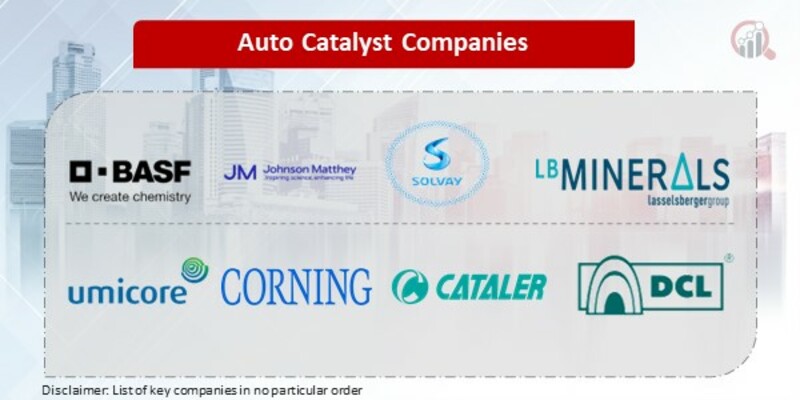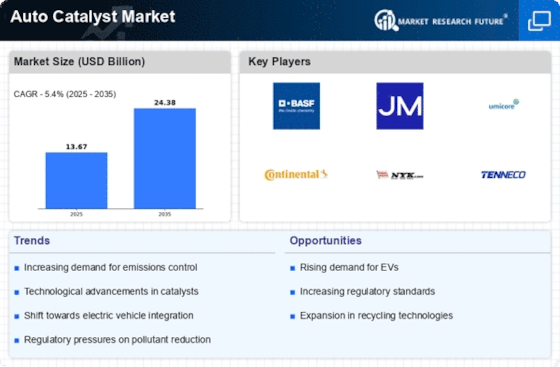Top Industry Leaders in the Auto catalyst Market
 The global auto catalyst market driven by stringent emission regulations, an increase in vehicle production, and the adoption of advanced catalyst technologies. However, navigating this market comes with its fair share of challenges, as competition between established players and new entrants intensifies.
The global auto catalyst market driven by stringent emission regulations, an increase in vehicle production, and the adoption of advanced catalyst technologies. However, navigating this market comes with its fair share of challenges, as competition between established players and new entrants intensifies.
Strategies for Market Share Dominance:
-
Innovation: Leading players like Johnson Matthey, BASF, and Umicore are investing heavily in R&D to develop more efficient and cost-effective catalysts. Recent innovations include lighter weight catalysts, catalysts for alternative fuels, and catalysts that enable higher fuel efficiency. -
Diversification: Companies are expanding their portfolios beyond traditional three-way catalysts into areas like SCR catalysts for diesel engines and ammonia oxidation catalysts for fuel cells. This diversification helps them cater to a wider range of vehicles and future emission regulations. -
Geographic Expansion: Established players are entering emerging markets like China and India, where strict emission standards are being implemented and vehicle production is surging. This provides access to new customer segments and growth opportunities. -
Vertical Integration: Some companies are integrating upstream with raw material supply or downstream with recycling facilities. This strengthens their control over the supply chain and enhances their profit margins. -
Strategic Partnerships: Collaboration with automakers, research institutions, and material suppliers is becoming increasingly important to share knowledge, reduce costs, and accelerate innovation.
Factors Influencing Market Share:
-
Cost Competitiveness: Price remains a crucial factor, particularly in emerging markets. Companies are focusing on optimizing production processes and sourcing raw materials competitively. -
Technological Expertise: The ability to develop and manufacture advanced catalysts with superior performance and durability is key to gaining market share. -
Customer Relationships: Building strong relationships with major automakers through high-quality products, technical support, and competitive pricing ensures consistent supply contracts and market access. -
Regulatory Compliance: Meeting evolving emission regulations globally requires constant adaptation and investments in research and development.
Key Players
-
BASF SE (Germany)
-
Johnson Matthey (England)
-
Solvay (Belgium)
-
LB MINERALS, Ltd (Czech Republic)
-
Umicore (Belgium)
-
Corning Incorporated (U.S.)
-
Cataler Corporation (Japan)
-
DCL International (Canada), among others
Recent Developments :
-
August 2023: Johnson Matthey announces plans to build a new $1 billion catalyst manufacturing facility in China, showcasing its commitment to the growing Asian market. -
September 2023: A global shortage of platinum, a key material used in catalysts, leads to rising prices and potential supply disruptions for catalyst manufacturers. -
October 2023: Several major automakers announce plans to increase production of electric vehicles, potentially leading to a decline in demand for traditional gasoline and diesel vehicles in the long run. -
November 2023: Researchers at MIT develop a new type of catalyst that uses readily available materials like iron and copper, potentially offering a more cost-effective alternative to traditional catalysts.











